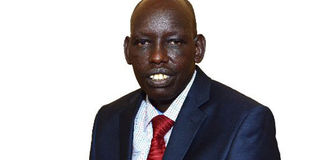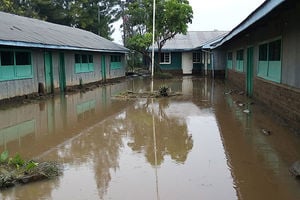Delayed school cash puts exams at risk

Education Principal Secretary Richard Belio Kipsang said the government will release Sh6 billion for the free learning programme by Friday. PHOTO/FILE
What you need to know:
- Unless it is resolved, this could affect thousands of students who will be sitting the national examinations slated to begin next week.
A stand-off is looming between secondary school headteachers and the Education ministry over the release of cash for the subsidised learning programme.
Unless it is resolved, this could affect thousands of students who will be sitting the national examinations slated to begin next week.
The national secretary-general of the Kenya Union of Post-Primary Education Teachers (Kuppet), Mr Akello Misori, yesterday told union members across the country to send all students home Wednesday if schools will not have received the money that was to be released at the beginning of third term.
Schools reopened early September and are set to close early December, but are yet to receive their allocations for the third term.
But speaking in Nairobi Monday, Education Principal Secretary Richard Belio Kipsang said the government will release Sh6 billion for the free learning programme by Friday.
From this amount, secondary schools will receive Sh4 billion while the rest will go to primary schools.
Dr Kipsang said the money will form part of the third tranche that was to be released this year.
“Kuppet does not have powers to send the students home,” Mr Kipsang said. “They should consult with us to know the reason of the delay of the funds.”
The best interests
Speaking during the signing of this year’s performance contracts, Dr Kipsang said the ministry had already confirmed availability of the funds.
“The Treasury has assured us that the money will be in our account before Friday so day schools will get the funds before the end of this month,” he said.
“Let them not cause panic to the pupils. We have the best interests of the students sitting for their national exams next week.”
But speaking in Bondo Town during the Kuppet Siaya branch annual meeting, Mr Misori said secondary school headteachers were having difficulties running schools effectively without the money, whose disbursement has been delayed by more than a month.
The delay has made it difficult for some schools to buy exam materials including those to be used in practical science tests, which begin in a week’s time.
“School heads have raised a lot of complains to my office,” he said.
“They are facing a lot of difficulties in managing their schools as a result of funds. The government has failed to make the funds available to school accounts.”
He warned the Kenya National Examinations Council (Knec) to call off the Kenya Certificate of Secondary Education (KCSE) examinations.
“Our schools cannot purchase the science equipment required by the students during the examinations,” Mr Misori said.
He added that day secondary schools were hardest hit and were unable to pay their suppliers because unlike boarding schools, they do not have alternative sources of income.
But speaking during the signing of this year’s performance contracts for staff at the Ministry of Education, Science and Technology at Kenya Institute of Education, Cabinet Secretary Jacob Kaimenyi warned that headteachers who misappropriate the money to be released this week will be prosecuted.
“Suspects of corrupt practices will be dealt with according to the law,” Prof Kaimenyi warned.
Earlier, headteachers had protested that they were having difficulties preparing for national examinations, which start next week, because they were yet to receive money for the third term, more than a month after schools opened.
The school heads had said that they had received a confidential communiqué from the examinations council directing them to buy laboratory materials to be used during the KCSE examinations.
They lamented that they had no money and could not get the materials on credit because they already owe suppliers substantial amounts.
On extraneous expenditure, Prof Kaimenyi said: “All financial commitments outside the budget, for example loans and mortgages, should first be approved by the Ministry and the Treasury before any formal undertaking by the respective institution.”
On the forthcoming examinations, Prof Kaimenyi said the ministry was putting stringent measures to curb cheating.
He also appealed to the public against blanket criticism of the Ministry of Education, saying, some of the criticism was not backed by evidence.
He was reacting to remarks by Kenya National Association of Parents chairman Musau Ndunda, who last week said that Kenyan schools were not safe because they lack fire extinguishers.





